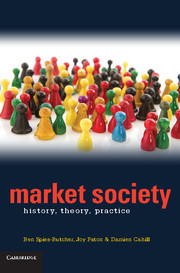Book contents
- Frontmatter
- Contents
- Acknowledgements
- 1 Introducing market society
- Part 1 Constituting market society
- Part 2 Regulating market society
- Part 3 Living market society
- 8 Work, consumption and quality of life
- 9 Family, environment and sustainability
- 10 Civil society, community and participation
- Concluding remarks
- References
- Index
9 - Family, environment and sustainability
from Part 3 - Living market society
Published online by Cambridge University Press: 05 June 2012
- Frontmatter
- Contents
- Acknowledgements
- 1 Introducing market society
- Part 1 Constituting market society
- Part 2 Regulating market society
- Part 3 Living market society
- 8 Work, consumption and quality of life
- 9 Family, environment and sustainability
- 10 Civil society, community and participation
- Concluding remarks
- References
- Index
Summary
THE PREVIOUS CHAPTER focused on work and consumption as two aspects of life most clearly identified with the economy. Traditionally, the study of economics evolved around the notion of the economy as a closed and discrete system with little attention paid to the broader social and ecological systems in which production for the market takes place. The natural environment was seen as a relatively limitless source of raw materials and an equally limitless destination for waste products. Non-market production occurring within the household was largely ignored as were the broader affective and reproductive functions of the family which raised, socialised and supported the workforce of (largely male) paid workers. In recent decades this neglect has begun to change due, in part, to real changes in the economy.
The limits of natural resources, the damaging effects of pollution and the large-scale entry of women into the workforce have all challenged the assumptions supporting Fordist production. This has prompted examination of issues like environmental behaviours, childcare, working hours and volunteer work. Such preoccupations also stem from social movements which have questioned our understanding of the environment and the family and raised important questions about the sustainability of our economic system. In this chapter we consider how economists have sought to incorporate these concerns into existing frameworks of economic analysis. We also consider an alternative reproductive framework in which market-based commodity production is located in the broader social and environmental systems that constitute a large part of our everyday experience.
- Type
- Chapter
- Information
- Market SocietyHistory, Theory, Practice, pp. 189 - 213Publisher: Cambridge University PressPrint publication year: 2012



